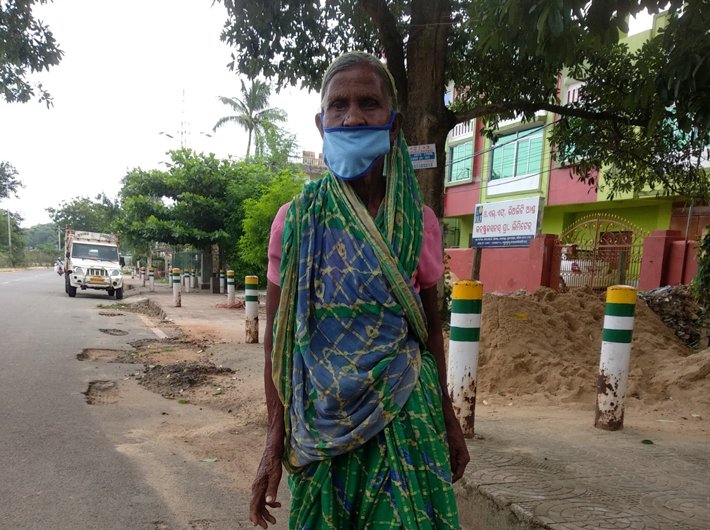On July 31, a few days after the central government announced the Unlock 3 guidelines, Odisha made public its own guidelines. Though the weekend shutdown will continue till August end, markets have opened in the coastal state. However, life is still far from being normal, as the fear of infection grips the people.
“The opening of markets or traffic is hardly going to ward off the Covid fear,” says a 31-year-old bank executive in Cuttack. “People are scared, they will take months to get rid of it,” he adds.
In capital city Bhubaneswar, 76-year-old Niranjan Panda is sceptical. “I don’t think I can be out of my house, before December,” Panda thinks.
With Covid cases climbing up in the coastal state, such sentiments are echoed across all age groups.
On August 18, reviewing the Covid situation in the state, chief minister Naveen Patnaik directed officials to adopt location specific strategies in high caseload districts (Khordha, Cuttack, Sundargarh and Rayagada) to reduce the positivity rate.
Incidentally, the last seven weeks, beginning early July, have redefined Covid’s horrible spectre in Odisha. As on August 18, the total number of confirmed cases stood at 64,533, with 18,803 being active cases. 45,315 patients had recovered and 362 dead.
The corresponding figures tell the story of how Covid has been lengthening its shadow. On July 31: Confirmed cases (31,877), active cases (11,917), recovered (19,746) and casualty (177). A month back, by June-end, confirmed cases and deaths reported were 7,065 and 25 respectively.
More tests have also contributed to the rise in numbers, experts say. Odisha has increased Covid-19 testing to more than 50,000 tests a day. In the number of tests, it’s the fifth in India after Uttar Pradesh, Tamil Nadu, Bihar and Karnataka. However, Odisha is ahead of the larger states in terms of tests per million per day at 1,096 and is followed by Andhra Pradesh, Tamil Nadu and Karnataka. The national average of per million tests per day is only 542.
Also, Odisha is planning to further increase the number of tests. The positivity rate in the state has come down drastically from 9.2 percent a month ago to 5.5 percent on August 16, the Odisha government said.
“There are a lot of asymptomatic cases. More tests mean more cases; this is as simple as that,” says a senior doctor in Bhubaneswar.
In the midst of the rise in numbers, Khordha district, in which Bhubaneswar is located, has been reporting the maximum daily cases in the last two weeks. Ganjam which remained the worst affected district for over two months, experts say, has witnessed the peak. Khordha in general and Bhubaneswar in particular are the new hotspots in the state.
As on August 18, the number of total cases in Khordha district stood at 9,380, of which Bhubaneswar accounted for 5,707 cases, including 1,983 active cases. While 3,690 patients have recovered so far, 28 succumbed to the virus.
According to senior gastroenterologist Dr Ashutosh Mohapatra, Odisha may witness the peak in the next four to five weeks. “Hopefully, it will be in the next four-five weeks. We have to be extremely cautious till September end or early October. After that, there will be a fall in the number in infections,” he says.
A senior Bhubaneswar-based pulmonologist and leading critical care expert believes that Covid cases are likely to peak in Bhubaneswar and also Khordha district by August end. He, however, cautions that Odisha has to remain alert at least till December. “Covid will remain a challenge for the next few months, till the end of this year,” the expert says.
As the state continues to grapple with the crisis, opposition parties have cried foul over alleged irregularities in the procurement of essential items for Covid management. Former IAS officer turned BJP MP from Bhubaneswar, Aparajita Sarangi, has asked the state government to clarify why PPE kits were procured from an optical store in Chennai and masks, testing and PPE kits purchased at higher prices from different companies in Punjab and Haryana.
Incidentally, in June, the Congress and BJP too had alleged such irregularities. The Congress also demanded that the government should make public the monetary transaction in the procurement of PPE kits, masks and nebulisers.
Rubbishing doubts over irregularities, a senior leader of the ruling Biju Janata Dal (BJD) said Sarangi should come up with conclusive evidence if there is any irregularity.
Incidentally, worried over the rise of cases, the Odisha government had brought the Covid-19 management under the ambit of its ‘Mo Sarkar’ (My Government) programme. The programme is monitored by the 5T (teamwork, technology, transparency, transformation and timeline) department.
Last month, Odisha ranked number 3 among Indian states in the category of Transparency in Covid management, according to a study by Stanford University researchers. The study was published on medRxiv. The information was shared by the BJD on its official Twitter handle.
Opponents, though, don’t agree. “From day one, the Covid management in the state has been faulty. The government is also not sensitive to the people’s plight,” Panchanan Kanungo, former finance minister in the BJD government who is now with the Congress, told Governance Now.
There are some who feel Covid management can be improved. “The communication to the people on Covid management needs to be more effective, consistent and transparent,” says former bureaucrat Aurobindo Behera. “Clarity of information will not allow confusion to set in the minds of the people,” he adds.
